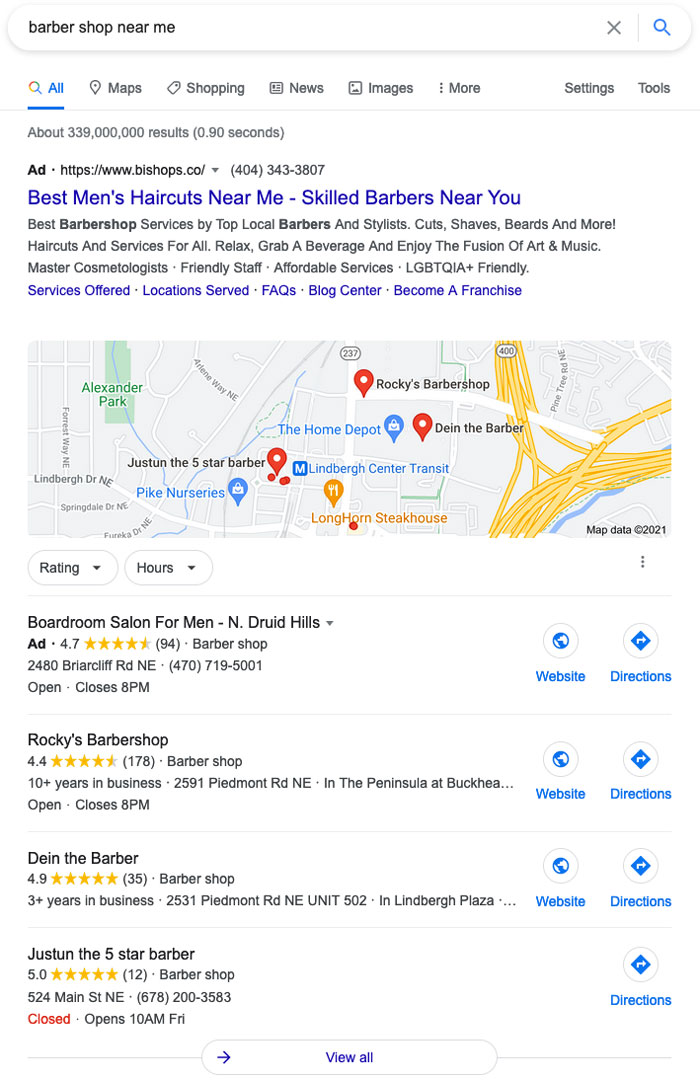*Updated Fall/Winter, 2022
Marketing your business online can be difficult. With digital tools becoming more complex and various, it’s hard to know which platforms to be on and how best to use them. In this post, we’ll cover how the majority of small businesses should be marketing themselves online today.
Google Ads

Google is still at the top of the food chain when it comes to marketing your business online. With over 3.5 billion searches made per day on Google, it is the superhighway of the internet. And just like a real highway, having your business name posted on signs next to an exit lets people know where to find you. You can think of Google Ads in much the same way.
Google Ads gives businesses a way to have links to their landing pages appear at the top of the search results page for selected keywords. Given that the top 3 Google search results get 75% of all clicks, having your link appear at the very top is incredibly important. But what is perhaps even more important is the search terms you select your ads to show up for.
This is because Google Ads works on a pay-per-click payment model. Simply put, every time someone clicks on one of your ads, you pay Google a set amount of money. How much you pay Google is determined by the cost-per-click (CPC) of a given keyword. CPCs can range quite a bit but are generally determined by a combination of the competitiveness and search volume of a given keyword. A keyword that receives a lot of daily searches and has a lot of businesses running ads on it is going to have a much higher CPC than one with low search traffic and low competitiveness.
Choosing the Right Keywords
On the surface, keywords that receive low search traffic may seem undesirable. However, this isn’t always the case. Small businesses with a limited marketing budget need to choose their keywords very wisely if they want to get the most bang for their buck. Because it’s very unlikely that a small business will be able to outcompete other large businesses that are running ads for high-traffic, high-cost keywords.
It’s also the case that many of these high-traffic, high-cost keywords are very broad in what they pertain to. Think of terms like Mechanic or Property Renovation. There are many types of mechanics in terms of what services they offer and the types of vehicles they work on. The same goes for the many ways you can renovate the many different types of properties that exist. A small business isn’t going to be able to cater to the needs of every user using these types of search terms.
Instead, small businesses are going to find more success targeting lower-traffic keywords that are more specific to what they do. Drawing from our previous examples, something like American Muscle Car Mechanic or Home Basement Renovation would be much better options since they target a narrower group of searchers. In this case, while not as many people are likely to see your ad, those that do are more likely to click on it and contact your business. But of course, there is always a fine balance that needs to be struck when it comes to selecting the right keywords.
The best tool to use when trying to figure out what keywords to run ads on is Google’s Keyword Planner. This tool allows you to look up a particular keyword and see its cost-per-click, search volume, and competitiveness. It will also show you similar keywords so that you can compare their metrics to your initial search term.
While there are many other facets to running a successful Google Ads campaign, choosing the right keywords is where it all starts. From there you can experiment with budgeting, what time and days to run your ads, and how to design your landing pages to maximize sales conversions. For small business owners with limited digital marketing experience, this can be a lot to figure out. In which case, hiring a Google Ads marketing professional might be the best option.
Google Maps

For brick-and-mortar businesses, getting your business’s location on Google Maps is essential. For most location based-business searches, such as barbershop near me, Google will display what’s called a Map Pack near the top of the page. The businesses that make it into the Map Pack for these types of searches are typically those nearest to the user at the time of searching with the highest review score. Businesses can also run Google Ads to have their business appear at the top of the Map Pack.
From here, users can choose to either visit a business’s website or get directions to its store location. Appearing within the Map Pack creates a great opportunity for users to give you a call, view your site, or head straight over to your business.
How to Get Your Business on Google Maps
Getting your business to appear on Google Maps is a simple 3-step process.
- Claim or create a Business Profile on Google.
- Verify your local business.
- Fill out your Business Profile with as much information as possible.
For more detailed instructions on how to get your business to appear on Google Maps, check out this article by Google.
Online Reviews

A business’s online reputation has become one of its most prized assets. This means that every business should be actively asking customers to leave 5-Star reviews on their Google Business Profile and other relevant review platforms.
There are a variety of ways to earn online reviews for your business. Broadly speaking, good strategies include:
- Email marketing campaigns
- Text messaging campaigns
- Placing signage within your place of business that promotes leaving a review
- Having links to your review profiles appear on your website
- Hiring a Reputation Management Company to carry out various review campaigns
When it comes to protecting your online reputation, earning more positive reviews can be just as important as addressing negative ones. This means responding to negative reviews as a way to remedy their negative experience and to get unhappy customers to either change or remove their reviews.
To learn about how to bolster your business’s online reputation, check out our post here.
Facebook Ads

Second to Google, Facebook is still a highly effective platform for small businesses to advertise on. With over 1.84 billion daily active users, Facebook is the most visited social network on the planet. Aside from having a massive user base, Facebook also gives advertisers some of the most advanced audience targeting tools on the internet.
Facebook’s Audience Insights gives you aggregate information on people who already like your Facebook Business page and those that don’t. You can then drill down within those groups using a variety of demographic filters. These include age, gender, education level, job titles, relationship statuses, and a ton more.
Using these filters allows you to learn more about your current customers so that you can better sell and advertise to them. You can learn about their hobbies, lifestyle, location, and other interests. This knowledge can then be used to create ads and content that target non-customers that are similar to your current ones, giving you a much better shot at earning conversions on your ads.
Facebook even offers a ton of resources and courses through Facebook Blueprint to teach you how to use its ad platform and targeting tools. But if you’re a business owner who simply doesn’t have the time to dedicate learning such a robust platform, hiring a social media marketing company can be a more cost-effective approach. This allows you to benefit from expertly managed ad campaigns so that you can focus on running your business.
Directories

While Google, Facebook, and other social network sites all qualify as directories, there are many more out there that can be hugely beneficial for your business. Choosing which directories to invest your time into will largely depend on your industry niche.
If you’re in real estate, then Zillow, Realtor, and Redfin are a must. If you’re a car dealership, then Cars.com and AutoTrader are the first to look at. For restaurants, you want to be on DoorDash, GrubHub, and UberEats to offer easy pickup and delivery orders. Then there are directories that every business should appear on. These would include the BBB (Better Business Bureau), Bizjournals, Chamber of Commerce, and eBussiness Pages.
For a list of the top 100 online business directories, check out this article.
The goal here is to get your business seen on as many platforms as possible. Greater visibility equals greater reach, which leads to more sales opportunities. Directories can also be an important source of traffic to your website and can improve your organic search rank on Google.
Search Engine Optimization

Most website owners at this point are familiar with search engine optimization (SEO), but perhaps don’t fully understand what all it entails. This isn’t surprising given that SEO has grown to encompass quite a lot in recent years.
At its most basic level, SEO is the process of getting your web pages to appear organically on Google and other search engines for relevant search terms. This means that every website should have some level of SEO performed on it. There is a long list of tasks that can be done on a website to improve its SEO and thusly its potential to rank highly on search engines for specific keywords. These tasks include:
- Keyword research
- Redirecting broken or old URLs
- Optimizing page titles, headings, and descriptions for target keywords
- Regularly creating content on fresh topics (e.g., blog posts, landing pages, videos, photos, and social posts)
- Getting your content shared on social media
- Optimizing web page content to include target keywords
- Optimizing images so that they load quickly on pages and include ALT tag descriptions
- Leveraging browser caching on your site so that pages load more quickly
- Reducing your website’s bounce rate (when a user immediately leaves your website after viewing only one page.)
- Redirecting crawl errors
- Adding structured data to web pages
- Getting your website to appear on directories and other data aggregators
- Having an optimized Google Business profile
- Having a high Google Review score with a high number of reviews
- Having other websites link back to yours
- Optimizing your website for mobile, tablet, and desktop view
As you can see, there is a lot that goes into SEO, and it’s why many businesses outsource this work to a professional SEO company. If you’d like to learn more about some of the SEO tasks we mentioned above, check out this post here or this one here.
Expand Your Business’s Reach in 2023!
If you haven’t started taking your business’s online presence seriously, now is the time to start. With more affordable marketing tools available to small businesses than ever before, every business has a shot at being seen and making a name for themselves.
If you’re still not sure how to best go about marketing your business online, give us a call to explore your options and learn what marketing strategies you could most benefit from.
